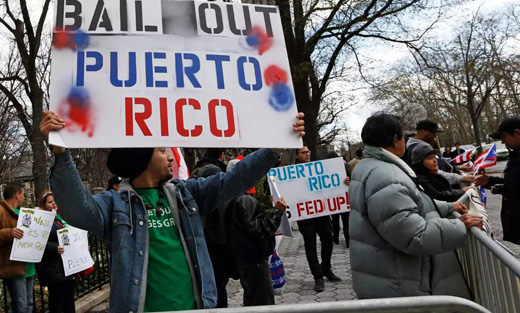
WASHINGTON – Holding their noses and faced with a July 1 deadline, senators voted on June 29 for a Puerto Rico fiscal rescue bill that cuts the island commonwealth’s minimum wage for young workers, by $3 an hour, to $4.25, endangers overtime pay and imperils union contracts there, the measure’s foes say.
Nevertheless, senators voted 68-30 for the legislation, which President Obama worked out with House Republican leaders and which sailed through that GOP-run body earlier this year by more than a 2-to-1 bipartisan ratio.
Had Congress not passed the bill, supporters – including both Senate party leaders – admitted, the Puerto Ricans faced the prospect of something far worse: Defaulting on $72 billion in debt to hedge funds, deepening the decade-long recession there, throwing even more workers onto jobless rolls, closing half of the island’s schools and eliminating many pensions.
Sens. Bob Menendez, D-N.J., and Bernie Sanders, Ind.-Vt., back from the presidential campaign trail, led the debate against the legislation. They said all the island’s 3.5 million residents would suffer, and that the Senate should have a chance to improve the House bill. Menendez, ten other Democrats, Sanders and 18 Republicans voted against the measure.
Its passage halts the hedge funds’ lawsuits in their tracks and preserves some vital services in Puerto Rico. But the bill also sets up an unelected financial control board to run the commonwealth’s budget and, Menendez says, veto any legislation the board dislikes.
Menendez concentrated on the harm to Puerto Ricans while Sanders targeted the hedge funds. The AFL-CIO, while taking no official position on the final legislation, blasted the funds’ role in the Puerto Rican crisis in an earlier executive council statement.
The bill would “cut the minimum wage to $4.25 per hour for young workers in Puerto Rico,” Menendez said. “It is a vote to make Puerto Ricans work long overtime hours, without fair compensation. It is a vote to jeopardize collective bargaining agreements. It is a vote to cut worker benefits and privatize inherently government functions.
“It is a vote to shut schools, shutter hospitals, and cut senior citizen pensions to the bone. It is a vote to put hedge funds ahead of the people. It is a vote to sell off and commercialize natural treasures that belong to the people of Puerto Rico, a vote to fast-track projects without a careful consideration of the environmental and health impacts.
“And, most of all, it is a vote against even attempting to fix these serious flaws.”
Sanders went after the financiers who pushed Puerto Rico to the brink. Hedge funds also opposed the legislation, saying it would take away money they claim is legitimately owed.
“This is not just about taking away the democratic rights of the people of Puerto Rico. It is about punishing them economically,” Sanders said. “Since 2006, Puerto Rico has been in the midst of a major economic depression. In the last 10 years, Puerto Rico has lost 20 percent of its jobs. About 60 percent of Puerto Rico’s adult population is either unemployed or has given up looking for work.
“Over the last five years alone, more than 150 public schools have been shut down and the childhood poverty rate in Puerto Rico is now 58 percent. There is a mass migration of professionals out of Puerto Rico to the mainland because there is simply no work on the island.
“In the midst of this human suffering and economic turmoil, it is morally repugnant that billionaire hedge fund managers on Wall Street are demanding that Puerto Rico fire teachers, close schools, cut pensions, and lower the minimum wage so that they can reap huge profits off the suffering and misery of the American citizens on that island.”
What Sanders called “vulture funds” bought Puerto Rican debt for as little as 29 cents on the dollar and are now reaping 34 percent interest on it, so the debt is “unsustainable and unpayable. That is just a fact. You cannot get blood out of a stone,” he stated.
But the hedge funds “want a 100 percent return” on their bonds and the financial board would eventually give it to them “while schools are being shut down in Puerto Rico, while pensions are being threatened with cuts, while children on the island go hungry. That is morally unacceptable. That should not be allowed by the Congress.”
The AFL-CIO used much the same language, blasting hedge fund “vultures” who “are opposing legislation that would allow Puerto Rico to file for bankruptcy” to restructure its debts. “The hedge funds, instead, are pushing for further austerity measures-an immoral position considering nearly half of Puerto Ricans already live in poverty,” the fed said.
Earlier, the AFL-CIO, the Service Employees, the United Food and Commercial Workers and the Auto Workers, who together represent 50,000 Puerto Rican workers, tried to convince senators to let Puerto Rico reorganize under bankruptcy law. They failed.
Sens. Sherrod Brown, D-Ohio, Joe Mancin, D-W. Va., and Shelly Moore Capito, R-W. Va., opposed the Puerto Rico measure for a related reason: Senate Majority Leader Mitch McConnell, R-Ky., barred amendments, including one they planned to offer to ensure retired coal miners’ pensions. The United Mine Workers strongly supports that plan, as the pension fund for the retirees faces its own July 15 deadline.
The union also plans a July 12 demonstration by miners and pensioners at the Capitol.
“We must send a message to the government and pressure them to keep America’s promise to thousands of retirees, spouses, and dependents. Coal miners were promised lifetime retirement benefits by President Harry Truman in 1946. So far, they kept that promise with passage of the COAL Act. With the majority of the coal industry in bankruptcy, miners are on the edge of losing everything they have worked for,” the union explains.
Photo: Kathy Willens/AP












Comments